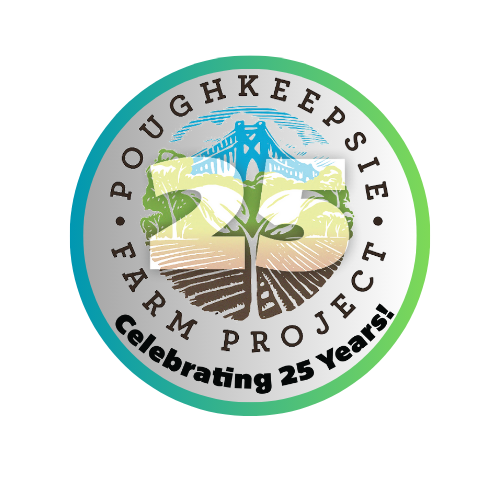Dear friends of the farm,
Our main growing season is right around the corner! We are already feeling that perennial shift into a season where production and programs become the centerpiece of our work. Before we dive into that, we wanted to pause to share more about the internal work we have been doing to get rooted in our mission from the inside out.
With the support of coaching with the Good Work Institute and consultant Nicole Bauman, Poughkeepsie Farm Project has been in the process of transitioning towards an organizational structure that fosters democratic practice and shared leadership.
So what does that mean?
In our case, that means:
Our leadership team is organized non-hierarchically as a set of Co-Directors
Utilizing a democratic decision making process that defines which decisions are made by whom and via which type of decision making process (ie. consent, consensus, supermajority, etc.)
Shifting towards organizing our work in “circles,” which are groups of workers with specific responsibility for a share of our work. Circles operate semi-autonomously but ultimately are accountable to the collective.
Developing communication, conflict (management or resolution) and anti-racism skills among staff to build strength, resiliency and trust into our relationships. These skills help to address long term workplace dynamics that may disrupt a transition towards equitable power sharing.
Strengthening collaborative relationships between all staff, across departments and between board members and staff members.
And why are we doing it?
Our mission is “to cultivate local leadership in sustainable farming, food access, and education, and to create an inclusive, welcoming community for all.” Please read on to learn more about how Shared Leadership, or workplace democracy, supports PFP to fully integrate its mission into how we operate and evolve as a non-profit farm.
1. Cultivating of Local Leadership:
Since 1999, PFP has aimed to root its programs in decentralizing the leadership, knowledge, skills and power needed for all to be agents in the creation of a resilient, equitable food system. For instance, our CSA began as a grassroots-founded and 100% workshare CSA, and our Green Jobs program pays City of Poughkeepsie young adults to receive training in urban growing, culinary skills, and food and social justice leadership.
Through workplace democracy, work at PFP becomes an opportunity for all to step up into leadership, accountability, and stewardship over our work and its evolution. This structure democratizes access to knowledge and power among those who have direct experience working in the fields, classrooms, and communities where a just food system is born. It’s important to note, however, that PFP’s structure will likely still include forms of hierarchy that allow people to relate to power within their current capacity, and engage with more equity in the workplace.
2. Sustainability
At PFP, true sustainability includes making local agriculture a viable, long term career path for all people who have the capacity and desire to farm (regardless of the intersecting identities they hold) and planning for the continuity of our food justice work.
Courageous feedback from outgoing employees in 2021 indicated that PFP has not always created a sustainable working environment for staff. It is important to us to honor the efforts of the caring employees who have advocated for our future farmers and a more sustainable workplace. Workplace democracy is a systems-level response to that feedback, as it is a structural shift to center the voices of those who are positioned most accurately to speak to what will make farming, food access and education truly sustainable in real time. It gives employees agency over their working conditions, rather than just more responsibility.
Importantly, the continuity of our work also depends on our ability to offer youth the opportunity to participate in a healthy and equitable workplace that emphasizes their worth, agency and value as people who will co-create and share responsibility for PFP’s food justice work long-term.
3. Inclusivity
PFP is made up of a multi-racial, cross-class, queer-abundant coalition of staff, leadership, board members, volunteers, program participants and community partners. Our work is not done until all people within our collective feel a sense of agency, belonging, integrity and joy in PFP’s work.
Thus, our Shared Leadership transition will not be complete without Anti-Racism threaded into every policy, practice, and cultural change. The oppression and exclusion of people who are low-income, people of color, or youth from important policy development and decision-making continues to disrupt the formation of a more just food system. PFP seeks to disrupt this status quo by transitioning to an internal structure and system of decision-making that proactively addresses the power imbalances that misdirect our work.
To new and long-time community members alike: Thank you for your support of our organization through this period of rebirth. We appreciate your care for our organization, for our farmers and educators, and for our land, and we literally could not do this without you.
In solidarity,
The PFP Team
PFP staff gathers in acknowledgement of the Spring Equinox.


